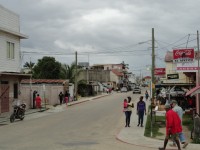Project: Municipal Development Plans for Seven Town Councils in Belize
Sponsor: Belize Social Investment Fund and the World Bank
Project Duration: January 2013 – January, 2014
Context: One of the smallest countries in Latin America, Belize’s economy is in the midst of a transformation. An emerging tourism sector, a nascent oil industry, and non-traditional agricultural exports like shrimp and papaya have fostered growth in the new century; however, the global recession of 2008/2009 hit the country hard, and poverty increased nationally between 2002 and 2009 from 34.1% to 41.3%.
The national urbanization rate of 3.1% per annum is now the third highest in Latin America – significant for a country whose urban population is the region’s lowest; in 2005, 50.2% of the population was urban compared to an average of 77% in Latin America and the Caribbean. Belize’s cities and towns must cope with the challenges of this growth, as migrants look to cities for new opportunities in a new economy.
Project Background: The government of Belize is undertaking a program to devolve significant municipal financial and managerial authority to local councils. As part of the World Bank-funded Belize Municipal Development Program, the local councils of seven of Belize’s municipalities will develop their own Municipal Development Plans through Local Planning Working Groups (LPWG). These plans will direct future development and provide the town and city councils with the tools to better manage new demands for services and infrastructure across different income groups, promote local economic development, strengthen local revenue generation and consider environmental risks when planning where new growth should be accommodated.
I2UD’s Work: The Institute has brought together an interdisciplinary team of regional and international experts to work directly with newly formed Local Planning Working Groups in each municipality. Support to these working groups has been provided through tailored training modules and technical assistance over a one-year period. There were five in-depth training modules covering the following topics: vision, strategy and growth scenario development; socio-economic development and community consultation; land use planning; infrastructure planning and financing; and the key strategies to implementing the municipal plan. The training programs have helped the Local Planning Working Groups to develop a cadre of professionals within the town and city councils who can introduce and sustain a planning culture in Belize. The project includes three national workshops at the beginning, middle, and end to allow the LPWGs to meet, present their work to national official levels, and exchange ideas. John Driscoll is the senior urban planner and project leader; Elda Solloso is the Fieldwork Coordinator; and Jim Kostaras is the urban designer.

